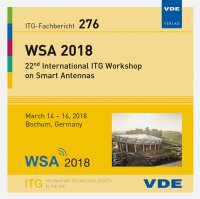Proper Time-Sharing as a Baseline for Studying Improper Signaling in Interference Channels
Konferenz: WSA 2018 - 22nd International ITG Workshop on Smart Antennas
14.03.2018 - 16.03.2018 in Bochum, Deutschland
Tagungsband: WSA 2018
Seiten: 6Sprache: EnglischTyp: PDF
Persönliche VDE-Mitglieder erhalten auf diesen Artikel 10% Rabatt
Autoren:
Hellings, Christoph; Utschick, Wolfgang (Professur für Methoden der Signalverarbeitung, Technische Universität München, 80290 Munich, Germany)
Inhalt:
So-called improper complex signals have been shown to be beneficial in the Gaussian interference channel under the assumptions that all input signals are Gaussian and that interference is treated as noise. In order to show the benefits of improper signals, it is necessary to know the best possible strategy with proper signals as a baseline for comparison. Two such baselines have been considered in the existing literature: globally optimal proper signaling strategies without time-sharing as well as with time-sharing in the sense of averaging the per-user rates over several operation points. In this paper, we discuss a third baseline solution: if we interpret time-sharing in a more general way and average not only the rates, but also the transmit powers over several operation points, we can obtain an enlarged proper signaling rate region. In a numerical example, we demonstrate that the comparison between proper signaling and recently proposed improper signaling solutions can lead to quite different conclusions depending on which proper signaling baseline is considered.


